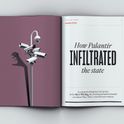The defence of Europe
I read, with great interest, Kim Darroch’s excellent article on the implications of a second Trump presidency. I agreed with virtually everything he said as to what Europe and the west should do over the next few months to prepare for such an eventuality.
There was, however, one important omission in his essay. Darroch covered the consequences of Trump’s hostility to Nato and his implied threats to take the US out of the alliance; and gave good advice as to how to mitigate the inevitable and serious damage. But he did not comment specifically on a potential withdrawal of the US nuclear umbrella that has, through Nato, protected Europe from the threat of Russian nuclear weapons since 1948.
A withdrawal of US commitment—even if the US remained a nominal Nato member—would subject Europe to the possibility of nuclear blackmail from the Kremlin. Even without deploying its nuclear arsenal, Russia could threaten its use if Europe tried to defend the Baltic states, Poland or other nations from Russian aggression or invasion.
There is a solution. The United Kingdom and France are Europe’s nuclear weapon states. Although their combined arsenal is far smaller than Russia’s, they could, in a nuclear war, destroy Russia’s cities and devastate its economy and infrastructure.
When I was defence and then foreign secretary in the 1990s, I initiated a dialogue with my French colleagues on the need for the UK and France to coordinate their nuclear weapons and work together. Much has been done by Labour and Conservative governments since to enhance that dialogue.
The UK’s nuclear weapons are already committed to Nato. The UK and France should now work with Germany and all other Nato member states to make clear that, whatever a Trump administration might do, a united Europe would have the means and the will to protect itself from nuclear blackmail by Putin and his successors.
Much work remains to be done on this. It should be a top priority for the UK, France and the rest of Europe during 2024.
Malcolm Rifkind, former Conservative defence and foreign secretary
Kim Darroch is perceptive on the dangers of a Trump presidency, but the unspoken issue is the damage done by the Democratic Party which has allowed MAGA to happen. The elite that dominates the Democrats has failed, over the last decade, to grasp the reasons for the rise of populism and address its own responsibility. The Democrat establishment assumed Trump would vanish, and Hillary Clinton only reacted—with horror but no understanding—when it became clear he was making waves.
Nor has the establishment made any attempt this time around to address the unpopularity of Joe Biden, whose approval rating stands at below 40 per cent. While it may be too late to remove him as the candidate, Vice President Kamala Harris should certainly be removed, as her ratings have been even worse. Unless the party can find a way to think more strategically, its future among the diverse groups that could constitute a progressive majority is grim.
Trevor Fisher, Stafford
A persecuted people
Alan Rusbridger is proud of saying “the unsayable”. He should know the 56 preceding years did not happen in a vacuum, either. So let’s hear about the 2,000 years or so of expulsion, persecution, dispossession, forced conversion, ghettoisation, stigmatisation, discrimination and genocide of and against Jews all over the world at the hands of non-Jews.
That leads to the powerful desire for, and defence of, a sliver of land —Jewish from biblical times—where Jews can be safe. Examine your arguments.
Ruth Deech, House of Lords
Beyond far-fetched
Imagine that back in 2019 you wanted to reverse Brexit—how could you possibly do it? (“Brexit hasn’t gone away. Just look at the polls”, February.)
First, get rid of Johnson. Then his inevitable continuity candidate, Truss. Still not enough, now you would have to overturn a seemingly impregnable Conservative 80-seat majority. After all that heavy lifting, economics would take its course, as Labour would find the European single market is intractably linked to UK economic welfare and necessary to make the sums add up.
But of course nothing like the above could ever happen in the real world.
chavbuster, via the website
House of two halves
Bill Keller warns that efforts to reform the House of Lords might inadvertently degrade the only functioning element of legislative scrutiny at Westminster. The contrast between peers’ careful examination of the Safety of Rwanda (Asylum and Immigration) Bill and the cursory scrutiny it has received from MPs provides a stark illustration of this risk. Keller is right that preserving the best elements of the Lords—including their expertise and diligence when it comes to legislative scrutiny—should be an important element of any proposal for Lords reform.
But those who care about the quality of the statute book need also to focus on getting MPs to up their game on legislative scrutiny. The urgency of Brexit and Covid set bad parliamentary precedents for legislating which now seem to have become the norm. Meanwhile, many MPs seem no longer to see themselves as legislators, focusing instead on constituency priorities or comparatively high-profile scrutiny of ministers.
In 2010, the Commons implemented reforms that radically improved the effectiveness of the policy scrutiny conducted by parliamentary select committees. We will likely have a new parliament before the end of 2024—that new parliament urgently needs a 2010-style reset of the way MPs scrutinise new laws.
Hannah White, Institute for Government
Apropos of Bill Keller’s article describing his visit to the House of Lords, could I suggest a reform that would satisfy both those who think that it ought to be elected and those who are impressed by its present contribution to our government: it should comprise the elected bodies representing men (and of course women) at work rather than where they live—the two not necessarily coinciding.
This new membership would draw from trades unions, businesses, the bodies representing farmers and fisheries, lawyers, medical men and women, schoolmasters, City companies, the Anglican churches (and perhaps other religions), insurance companies, shipping (perhaps Lloyd’s), women’s institutions, athletes, military men—plus privy counsellors, the mayors of conurbations, counties and any other considerable body.
I would add that it should be presided over by the heir to the throne (which should familiarise him with government and give him something to do). Surely this is the way to improve parliamentary government and bring it up to date.
John A Davis, Cambridge
Wealth of misconception
Sheila Hancock and Alice Garnett suggest one of the great intergenerational divides is inequality of wealth—in particular, the increase in the value of houses, which is the main wealth component for older people. It is not all as it is made out to be. I believe that I am fairly representative: I bought my home for £300,000 in 1991, and one calculator places today’s inflation-adjusted value at just over £800,000. This represents a notional profit of £500,000 over 33 years.
But of course it is no profit at all. This increase in worth is of no value to me. It does not increase my income, does not allow me to embark on adventurous and expensive holidays nor buy a luxurious car. All of these things, which in fact I cannot afford, I would have to pay for from my retirement income which—like that of many others—is being squeezed by the rising cost of living. It is true, of course, that as a store of value it might well be needed to pay for long-term care, which I cannot pay for out of income.
The country has complex and major issues to resolve. Blame-gaming between generations, political parties and indeed between any other of the myriad groups into which humanity divides itself will only make understanding harder to come by and resolution more difficult to achieve, to the detriment of all of us.
DB Northrop, via email
Sheila Hancock and Alice Garnett agree there are “snowflakey” tendencies in the younger cohort. The thing about snowflakes is that if you add enough together, you have an avalanche. Once my lot (50-plus) are sufficiently cleared away I do think the world will improve.
Mark Earls, via the website
Captured corporation
Alan Rusbridger’s article is a well-researched piece of journalism. But I remain somewhat sceptical that—in the words of the subtitle—“a tight-knit clique… is undermining the independence of public service broadcasting’’. As a regular listener to Radio 4, I see no signs of such a thing. Some of the people Rusbridger describes may be on the BBC board and hence have influence on editorial matters. But I can’t help remembering Labour spin doctor Alastair Campbell’s almost daily interference (via phone calls and emails) with the Today programme’s coverage of the Iraq War on behalf of Tony Blair—an attempt to pressure the BBC to change its stance.
Campbell, it later transpired, had even considered legal action over the issue. His was a clear case of attempted intimidation—and it bore fruit, with the 2004 resignation of director general Greg Dyke over criticism in the Hutton inquiry of the BBC’s reporting. No wonder that inquiry’s report was warmly welcomed by the Labour government of the time.
Diran Meghreblian, Richmond
Keep digging, Alan! How is it that the “Fever” sex parties didn’t stop Dougie Smith’s rise to power? Too much knowledge of well-known people’s private lives? As a former BBC employee, this line feels particularly poignant: “We used to think of the DG as being our editor-in-chief, and what you realise is that he’s like the CFO.” Also, the whole idea of “impartiality” being run as a plausible form of “helping the Conservative underdogs” is appalling.
Colleen Murrell, via the website
Inside the black box
Ethan Zuckerman suggests that a brave new world was ushered in by the advent of Apple Macs, because users had no idea what went on inside these machines. Yet people had been using televisions and telephones for decades before Jobs’s invention was unveiled, and radios for even longer before that. Most, I would guess, had no idea what an electromagnetic wave was, nor a cathode ray tube.
The expression “black box technology” may be relatively new, but what it describes most certainly is not.
Paul Moss, west London
The very long view
I have voted in every election since 1945 (I am 99), but never have I seen the issues confronting the UK so clearly set out. The article by Sam Freedman should be made widely available.
His conclusions are stark: the public services require improvement, but no one should be under the illusion that these improvements can be achieved quickly and without sacrifice. Choices will have to be made and taxes raised to provide the means. Labour should be brave enough to admit this and at the same time ensure that the sacrifices are not borne by the weakest.
Norman Graves, professor emeritus, UCL
Culture of impunity
The public and the media are now so accustomed to government officials squandering public money through stupidity and/or cupidity that the item examined by David Allen Green is already fading from the headlines. No one’s been fired for it... I was going to term it “remarkable”, but sadly it isn’t.
BigNellie, via the website
Sargent showy
While John Singer Sargent was obviously interested in clothes—what artist is not?—he was not fixated on the showy and extravagant, contrary to the impression given by your review.
Fergus Magus, via the website
Flat-earth factoids
When the issue for March appears in January, one realises that Prospect has found a way to bend time to its will. And space, too, it seems. You report (“In fact”) that it is possible to sail from India to the US in a straight line... How can a line be straight on a globe? The ship may plot a straight course, but that’s not the same thing. Or has Prospect decreed a globally flat earth?
Simon Franklin, Cambridge












